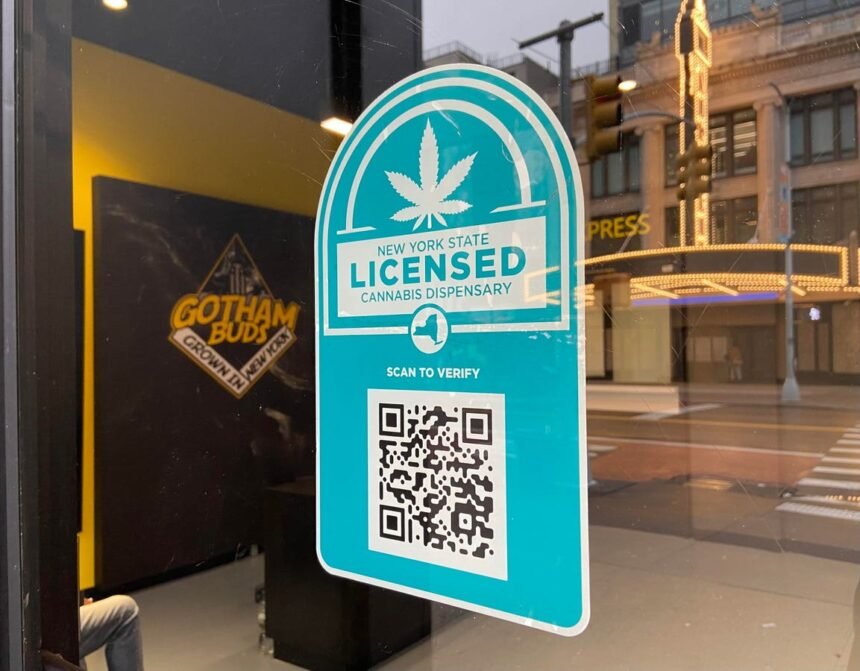New York, NY USA – December 1, 2023 : “New York State Licensed Cannabis Dispensary” sign from Office … [+]
New York Gov. Kathy Hochul has announced new appointments for the state’s cannabis regulatory agency following the resignation of former Executive Director Chris Alexander.
These leadership changes are part of Hochul’s effort to change the direction of the legalization of cannabis sales in the state, which has faced multiple issues since its implementation.
Felicia A. B. Reid has been named Executive Deputy Director and Acting Executive Director at the Office of Cannabis Management (OCM), the cannabis regulatory agency of New York, and will be responsible for major operational and regulatory functions such as licensing, compliance, and enforcement.
Reid brings over a decade of state government experience, including six years at the Office of Children and Family Services, where she was Deputy Commissioner overseeing statewide juvenile justice operations, according to Hochul’s press release.
In addition, Susan Filburn, with more than 20 years of experience in State government, has taken on the new role of Chief Administrative Officer, where she will concentrate on stabilizing and formalizing the agency’s administrative functions to support its licensing, compliance, and enforcement operations, while Jessica Woolford, who previously served as Director of Communications at OCM, has been promoted to Director of External Affairs, tasked with prioritizing communication and community engagement during the agency’s transformational changes. She will also establish the agency’s first customer service team to provide transparency regarding processes to applicants, licensees, and consumers.
Reid’s appointment is temporary, as Hochul’s Appointments Office is also searching for a permanent replacement for Alexander.
The new appointments announced on June 10 aim to resolve the backlog of license applicants, enhance communication with both applicants and licensees and reinforce the agency’s dedication to the social equity goals outlined in the Marihuana Regulation and Taxation Act, the legislation that legalized cannabis in New York.
Governor Hochul is implementing substantial reforms in the state’s cannabis regulatory system after a report revealed major flaws in the launch of the legal cannabis market.
In May, an audit on New York’s adult-use cannabis market rollout was released.
During a press conference on May 10, it was announced that Alexander would not be reappointed to lead the OCM. A few weeks later, Alexander resigned.
The Office of General Services’s audit of the OCM identified several critical issues.
Limited administrative capacity and decentralized operations caused inefficiencies in application processing and license management.
Confusing licensing requirements and poor customer service further complicated matters.
A lack of data and key performance indicators (KPIs) hindered progress tracking and decision-making, while multiple unintegrated IT systems added to overall inefficiency.
Additionally, the audit found OCM had underspent its budget by $26 million, left 13 positions vacant, and used six different licensing systems since early 2022.
There were no clear processes for denying applications or informing applicants of their status, leading to delays.
Conflicts of interest were also noted, with policy-makers processing applications.
In response, Hochul directed her team to work with OCM to implement the report’s recommendations, including clearing the licensing backlog within 90 days and improving communication with applicants and announced corrective measures, including a $5 million grant program for license holders and the creation of a task force to combat illegal cannabis shops.
Hochul aims to revitalize the market and ensure its success and fairness by addressing regulatory failures and enhancing support for legal operators.
These changes are part of a broader problem with the implementation of the legal cannabis industry in New York.
The state legalized cannabis in March 2021, but delays, legal battles, and poor organization in issuing licenses have slowed the implementation of the legislation.
These factors have delayed the launch of the legal market, which occurred in late December 2022.
The legal market, which currently consists of 132 licensed dispensaries across the state, also has to compete with an illicit market of thousands of unlicensed vendors and dispensaries that have popped up across the state. The New York Times reports that nearly 3,000 unlicensed dispensaries operate in New York City alone, despite the government trying to crack down on them.
The OCM has granted a total of 1,117 licenses for cultivation, manufacturing, and retail. This includes 463 social equity retail permits issued last year, as well as the 654 adult-use licenses awarded thus far in 2024, and overall sales have reached $357.3 million since the legal market launched in December 2022, as reported by Green Market Report, taken from the OCM’s board meeting on Tuesday.











